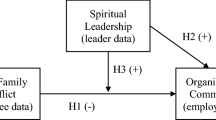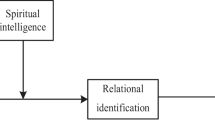Abstract
This study investigates and compares the impact of spiritual leadership on organizational citizenship behavior in finance and retail service industries to determine the possibility of generalizing and applying spiritual leadership to other industries. This study used multi-sample analysis of structural equation modeling. The results show that values, attitudes, and behaviors of leaders have positive effects on meaning/calling and membership of the employees, and further facilitate employees to perform excellent organizational citizenship behaviors, including the altruism of assisting colleagues and the responsible conscientiousness toward organization. The effect of altruism toward colleagues is especially stronger. Finally, the effect of leaders’ values, attitudes, and behaviors on the spiritual survival of employees is stronger in retail than that in finance.

Similar content being viewed by others
Notes
Target coefficient (T) = first order-measurement model χ2/second-order measurement model χ2.
References
Anderson, J. C., & Gerbing, D. W. (1988). Structural equation modeling in practice: A review and recommended two-step approach. Psychological Bulletin, 103(3), 411–423.
Bagozzi, R. P., & Yi, Y. (1988). On the evaluation of structural equation models. Journal of the Academy of Marketing Science, 16(1), 74–94.
Bentler, P. M., & Bonett, D. G. (1980). Significance tests and goodness of fit in the analysis of covariance structures. Psychological Bulletin, 88(3), 588–606.
Cavanagh, G. F. (1999). Spirituality for managers: Context and critique. Journal of Organizational Change Management, 12(3), 186–199.
Champoux, J. E. (2000). Organizational behavior: Essential tents for a new millennium. Cincinatti, OH: South-Western College Publishing.
Fairholm, G. (1997). Capturing the heart of leadership. Westport, CT: Praeger.
Fornell, C., & Larcker, D. F. (1981). Evaluating structural equation models with unobservable and measurement errors. Journal of Marketing Research, 18(1), 39–50.
Fry, L. W. (2003). Toward a theory of spiritual leadership. The Leadership Quarterly, 14(6), 693–727.
Fry, L. W., Vitucci, S., & Cedillo, M. (2005). Spiritual leadership and army transformation: Theory, measurement, and establishing a baseline. The Leadership Quarterly, 16(5), 835–862.
Lawrence, R. M., & Duggal, A. (2001). Spirituality in psychiatric education and training. Journal of the Royal Society of Medicine, 94(6), 303–305.
MacNeil, I. R. (1985). Relational contract: What we do and do not know. Wisconsin Law Review, 3, 483–525.
Marsh, H. W., & Hocevar, D. (1985). Application of confirmatory factor analysis to the study of self-concept: First- and higher order factor models and their invariance across groups. Psychological Bulletin, 97(3), 562–582.
Mayfield, J., & Mayfield, M. (2002). Leader communication strategies critical paths to improving employee commitment. American Business Review, 20(2), 89–94.
Milliman, J., Ferguson, J., Trickett, D., & Condemi, B. (1999). Spirit and community at southwest airlines: An investigation of a spiritual values-based model. Journal of Organizational Change Management, 12(3), 221–233.
Moorman, R. H., Blakely, G. L., & Niehoff, B. P. (1988). Does perceived organizational support mediate the relationship between procedural justice and organizational citizenship behavior? Academy of Management Journal, 41(3), 351–357.
Morrison, E. W., & Robinson, S. L. (1997). When employees feel betrayed: A model of how psychological contract violation develops. Academy of Management Review, 22(1), 226–256.
Moxley, R. S. (2000). Leadership and spirit. San Francisco, CA: Jossey-Bass.
Nunnally, J. C., & Bernstein, I. H. (1994). Psychometric theory (3rd ed.). New York: McGraw-Hill.
Organ, D. W. (1988). Organizational citizenship behavior: The soldier syndrome. Lexington, MA: D. C. Heath.
Organ, D. W., Podsakoff, P. M., & MacKenzie, S. B. (2006). Organizational citizenship behavior: Its nature, antecedent, and consequences. Thousand Oaks, CA: Sage.
Palmer, P. J. (1994). Leading from within: Out of the shadow, into the light. In J. A. Conger (Ed.), Spirit at work (pp. 19–40). San Francisco, CA: Jossey-Bass.
Podsakoff, P. M., MacKenzie, S. B., Paine, J. B., & Bachrach, D. G. (2000). Organizational citizenship behavior: A critical review of the theoretical and empirical literature and suggestions for future research. Journal of Management, 26(3), 513–563.
Reave, L. (2005). Spiritual values and practices related to leadership effectiveness. The Leadership Quarterly, 16(5), 655–687.
Robinson, S. L., Kraatz, M. S., & Rousseau, D. M. (1994). Changing obligations and the psychological contract: A longitudinal study. Academy of Management Journal, 37(1), 137–152.
Ross, L. (1995). The spirituality dimensions: Its important to patients’ health, well-being, and quality of life and its implications for nursing practice. International Journal of Nursing Studies, 32(5), 457–468.
Rousseau, D. M., & Parks, J. M. (1992). The contracts of individuals and organizations. Research in Organizational Behavior, 15, 1–43.
Wagner-Marsh, F., & Conley, J. (1999). The fourth wave: The spiritually-based firm. Journal of Organizational Change Management, 12(4), 292–302.
Williams, L. J., & Anderson, S. E. (1991). Job satisfaction and organizational commitment as predictors of organizational citizenship and in-role behaviors. Journal of Management, 17(3), 601–617.
Author information
Authors and Affiliations
Corresponding author
Rights and permissions
About this article
Cite this article
Chen, CY., Yang, CF. The Impact of Spiritual Leadership on Organizational Citizenship Behavior: A Multi-Sample Analysis. J Bus Ethics 105, 107–114 (2012). https://doi.org/10.1007/s10551-011-0953-3
Received:
Accepted:
Published:
Issue Date:
DOI: https://doi.org/10.1007/s10551-011-0953-3




